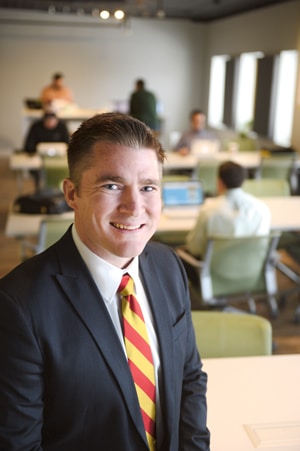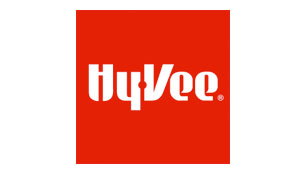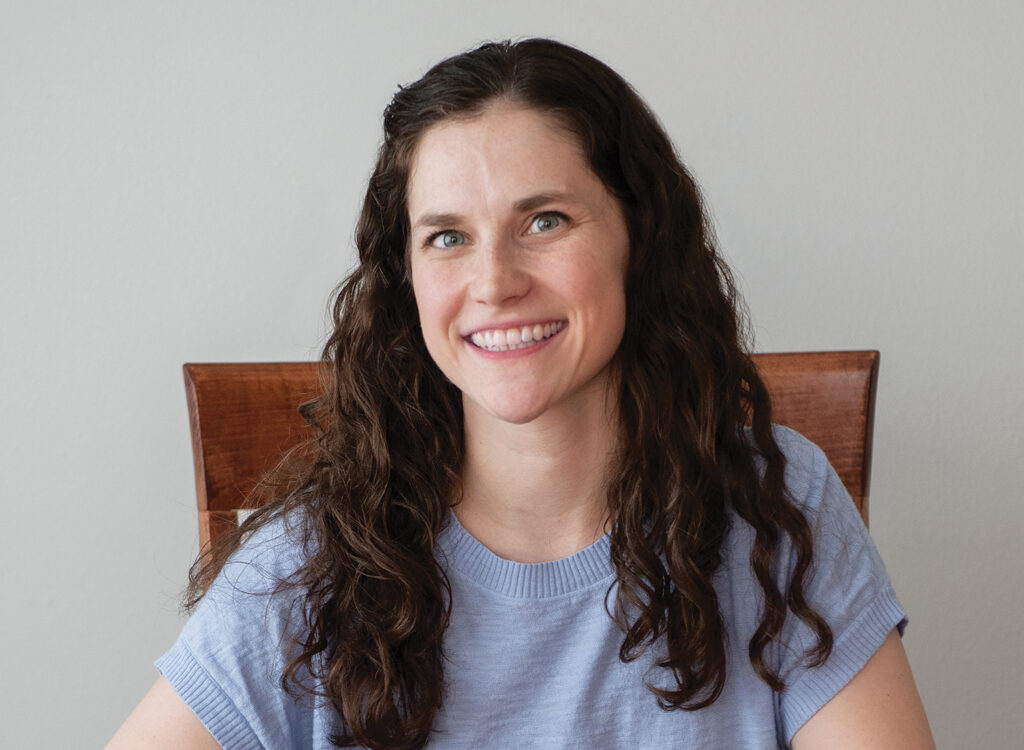Building Entrepreneurship
Simpson, Drake, DMACC launch new initiatives

PERRY BEEMAN Feb 13, 2015 | 12:00 pm
9 min read time
2,070 wordsBusiness Record Insider, Innovation and EntrepreneurshipIt’s a hot time for entrepreneurship on campuses.
Schools have taken varying approaches, but their goals typically boil down to this: Teach students how to explore new ventures, attract the capital needed to sustain them, and develop and market the product.
Most area schools have some type of entrepreneurship program. The trend, though, has been to far more hands-on activities, with students either coming up with their own businesses or helping develop ideas from others. Several Greater Des Moines colleges and universities have new initiatives in entrepreneurship.
Here’s a look at three:
Simpson sees businesses emerge
Initiatives range from finding crooks to permanent parking-space markings
Simpson College is forming teams of students, professors and community members from around the state to create or develop startup ideas. The program is called EMERGE@Simpson, and it has had a hand in everything from developing an app that helps solve crimes to coming up with permanent markings for parking spaces at businesses.
Those 34 ventures have attracted $150,000 in direct cash investment. Including equity positions in lieu of cash, the program has already amassed $643,000 for ventures involving 161 students, industrialists and entrepreneurs, said Chris Draper, program director.
What started as an Indianola partnership with local development and utility organizations now has plans to develop business proposals in Storm Lake, Clarinda, and elsewhere with students from Simpson and other schools.
You might be surprised to learn that Draper doesn’t even consider this an attempt to create entrepreneurs, in the common way higher education approaches the topic.
“We don’t grow entrepreneurs,” Draper said. “We help people become experts in an entrepreneurial environment. Trying to create entrepreneurs usually fails.”
The idea at Simpson is to put together a team with the right skills to get the job done, Draper said. Businesses can either pay the students and professors involved outright, under guidelines laid out on the program’s website, or they can consider offering equity. The program tracks all efforts in detail so the participants can be compensated.
In one case, a line of permanent pavement markings, the company, LNR, is close to being sold for six figures, Draper said. The markings will last 20 times longer than paint and should be particularly economical for parking lots, where the labor is more of an issue than the amount of material, he added. Tests of the material on pavement found no cracking over three years. The product came from research on quick-setting concrete.
The effort involved several students, two professors and four industry representatives, working with a personal idea from a former executive at Cemen Tech Inc. of Indianola.
“It’s a really great example of how the system can work really well,” Draper said. “What makes us different is the other programs have students come up with the idea and learn all the pieces. We look for really solvable problems that industry identifies,” then launch a team with the proper skills to bring it to market, he added.
“EMERGE ventures range from concrete technology to mobile apps, negotiation software to dog food,” Draper said. “This focus on building fully formed teams means that no one person is unreasonably expected to do everything – allowing for better businesses faster.”
Many Iowans aren’t used to negotiating their way through a business proposal and the risk it presents. Instead of hiring a full staff, they can explore the idea with the help of students and professors.
“Every small business needs sweat equity,” Draper said.
In another case, a Polk County detective, John Negrete, worked with Simpson students to get the mobile app Snitch’n released. The app allows mobile phone users to see the photos of people wanted by police, then send tips directly to investigators. The detective owns the business, but can choose to pay students for their time or offer equity, Draper explained. Iowa’s 5th Judicial District has signed up for the $1.99 per month per officer service for departments, and talks are proceeding with various police departments from Virginia to Washington state, Draper said.
The tips that have poured into the free mobile app have included descriptions of a suspect’s vehicle, workplace, work schedule and other helpful details.
Some ventures were started primarily with Simpson students, Draper said. But he sees the real power of EMERGE in ideas from the community that professors and students can work on.
“If the company sees value, they pay for the work; if nothing comes of it, those who worked on it gained experience and equity. That reduces businesses’ risks in trying new things,” Draper added.
“If things go very well, everyone is compensated fairly,” Draper said. “If it doesn’t, you don’t get anything.”
EMERGE also is positioned to help boost the area’s offerings in science, technology, engineering and mathematics (STEM), a key state goal, Draper said.
“Finding STEM workers requires the creation of opportunities,” Draper said. “We have great intellectual property generation in our colleges, universities and companies, we have accelerators and programs for giving a kick-start to fully formed teams, and the state does a remarkable job helping big companies grow massive. We intend to be a free-market economic tool for connecting our communities. Anyone walking in the door can connect to teams of technologists that need their help in a fair, transparent manner.”
Draper said the outreach to the rest of the state will continue.
“Our goal is to be that option where, if I were to walk into the economic development office or even a coffee shop in Palo Alto County, I could plug into EMERGE and contribute my expertise to any team in the network.
“To support these teams that are already forming, we are working to build a fund that can strategically microinvest and microlend. Our long-term goal is to make access to targeted human expertise and capital resources available to every Iowan – rural or metro – so anyone has the ability to create their future in their community.”
Basketball, brake lights and blush
Drake, with assist from alumnus, helps students launch business ventures
At Drake, entrepreneurship has come with a little help from a well-placed friend.
Drake alumnus John Lorentzen, a partner in Winston & Strawn in Chicago, financed what became the Lorentzen Student Hatchery last spring, said Tom Swartwood, assistant professor of practice-entrepreneurship. Lorentzen earned degrees in political science, economics and management.
The program serves an a incubator for student businesses.
The initial collection of businesses in the incubator, chosen after a competition open to all students interested in starting a venture led to four proposals:
– Reflex Fight Fear produced a training device targeted at mixed martial arts fighters and other athletes interested in developing better hand-eye coordination.
• The nonprofit Opportunity on Deck offered baseball and basketball clinics to children in Des Moines.
• Frank’s Fixies, distributed and built custom fixed-gear bikes.
• AP Lumina created an innovative brake-lighting system for cars and trucks.
Students at all four worked with Geoff Wood at StartupCity Des Moines, which now has closed. Wood, now at Gravitate, said he is in talks with Drake about helping with future classes.
Teams also made presentations to the weekly One Million Cups meetings, which give entrepreneurs a chance to make brief presentations about startups and get feedback from mentors, advisers and other entrepreneurs. Each team was paid a stipend of $5,000 to $7,500. The idea was to encourage students to spend the time and resources needed to get their projects launched.
All four businesses were operating by the end of summer.
AP Lumina was selected to participate in a graduate design program at Iowa State University and received working prototypes.
Now, the program is working with five new ventures that will be launched this summer, Swartwood said. Monthly meetings give those students, and others, a chance to discuss starting a venture.
“We recognize that startups do not happen just once a year, and we and Mr. Lorentzen want to foster an ongoing culture of innovation and startup energy on campus,” Swartwood said.
In addition, Drake isn’t just interested in budding engineers, or computer programmers. Entrepreneurship can come from the arts, and any other field.
“We expect students from all Drake colleges to participate and have already identified music, writing and other creative students interested in participating and availing themselves of the support and resources we can make available through the Hatchery and the entrepreneurship centers at Drake,” Swartwood said. “We are working with faculty in the writing program and the music program to develop collaborative platforms for their students, and we are working with the Des Moines Social Club in developing a new music business class and internship program.”
“Greater awareness of the possibilities for entrepreneurship and startup ventures on campus and greater involvement of students from all across campus are our goals,” Swartwood added.
The immediate focus is a successful second round.
“We are confident that the new ventures selected for this summer will launch, and we expect the first two groups of participants to serve not only as models but as mentors and collaborators for subsequent ventures,” Swartwood said. “We have had great support from the startup community in Des Moines, and we are confident that we are developing new and creative startup entrepreneurs.”
2015 Startups
This year’s participants, chosen from 13 applicants, include:
– Glimpse: Designed to share experiences around the world with live video-streaming, with shopping and browsing, too.
– Great Dates: A mobile app with this slogan: “We remove the stress from dating by suggesting where to go and what to do.”
– Kelsi Ziemann Artistry: A professional service-based cosmetics company that offers on-location makeovers.
– Settled In: A service that caters to campaign staffs moving to Des Moines by arranging their housing, furniture and transportation in advance.
– Snippster (originally Tailored): On-demand tailoring, with measurements taken at the customer’s location and delivery within two to four days.
DMACC expanded offerings
DMACC to offer new entrepreneurship degree
Des Moines Area Community College this fall is expanding its entrepreneurship program, which currently offers a certificate and a diploma, to include an associate in applied science degree focused on business entrepreneurship.
“This will make the entrepreneurship process more seamless, and if they so desire, students will be better able to transfer those courses to a four-year institution,” said spokesman Todd Jones.
The community college’s main classes in entrepreneurship include small business management, strategies in small business marketing and small business startup. The school also offers internships at local companies to help groom talent.
DMACC teaches students how to take an idea and turn it into a successful business, with the help of area executives and business owners who serve on Sector Boards. Those represent advanced manufacturing, bioscience, information technology, auto mechanics, construction and other fields. “They provide feedback and direction so our programs provide better educated, trained and work ready graduates,” Jones said.
“We are not only just teaching entrepreneurship in the classroom setting; we are giving them real-world experiences by touring businesses, creating an annual Entrepreneurship Day event in which we bring in successful entrepreneurs to share their stories of success as well as the pitfalls for starting a business,” Jones added.
The key metric to success is that the program is growing, Plus, more and more students are taking the business courses in other majors like never before, Jones said. They see the value in business management, thinking creatively and developing marketing skills whether they start a business or not, because those skills gives them a competitive advantage as an employee, he added.
Ninety-five percent of DMACC graduates live and work in the area after graduation, Jones said, part of DMACC’s contribution to economic development in the area. Another element: DMACC’s partnerships with area businesses. One example is a series of boards that are made up of executives and business owners from various industries. Some that are represented include Advanced Manufacturing, BioScience, IT, Auto Mechanics and Construction.
Also, DMACC co-sponsors the Dream Big Grow Here regional entrepreneurial competition of MyEntre.Net, and related events statewide. The DMACC Foundation created and held the first DMACC entrepreneurship competition.
In 2013, the college created the DMACC Small Business Awards. The school honors a Young Entrepreneur of the Year, Most Innovative Company, Top Growth Company and Small Business of the Year, and presents the Dennis Albaugh Award, in honor of the famed Ankeny businessman.
DMACC also awards business grants with its workforce and economic development funds to entrepreneurs and small business owners for training and other business needs.











